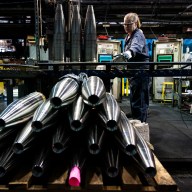
Julian Assange appeared at SXSW’s Interactive conference Saturday via Skype, addressing thousands of attendees from Ecuador’s embassy in London. It was a rare public appearance for the embattled WikiLeaks co-founder and a prelude for the conference to a similar webcast with Edward Snowden on Monday.
A good deal of Assange’s panel focused on Snowden’s former employer, the National Security Agency. “The NSA has grown to be a rogue agency. It has grown to be unfettered,” Assange told interviewer Benjamin Palmer of the Barbarian Group. “The ability to surveil everyone on the planet is almost there, and arguably will be there within a few years. And that’s led to a huge transfer of power from the people who are surveilled upon, to those who control the surveillance complex.”
 Julian Assange addresses SXSW attendees via Skype. Credit: Getty Images
Julian Assange addresses SXSW attendees via Skype. Credit: Getty Images
Assange took particular issue with new legislative measures in the U.S. to “stop publication of material about” the NSA. “There is a really serious attempt to try and stop these revelations and others, and introduce a new international regime of censorship,” he said. “The laws that apply to the Internet apply to human society. This penetration of the Internet by the NSA … is the penetration of our human society. It means there has been a militarization of our civilian space.
“We have to do something about it. All of us have to do something about it,” Assange told the virtual audience. “We are now all involved in this. We are all involved in what we traditionally called the state, whether we like it or not. So we have no choice but to try to manage the behavior of the state that we have been forced to be part of.”
As for his time in London with his Ecuadorian hosts? “The U.K. government has admitted to spending $8 million so far just on the police surveillance of the embassy,” Assange said before quickly clarifying, “It’s a bit like prison. Arguably prison is far worse in relation to restrictions on visitors, for example, and the level of bureaucracy involved.”
















